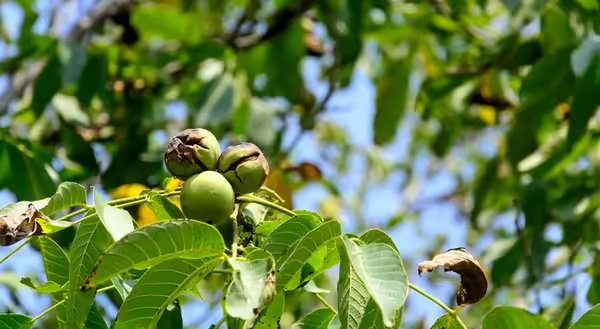
Some plants don't seem to play well with others. In particular, a few plants release chemicals to try to keep other plants from growing too near. This botanical war tactic is known as allelopathy.
Black walnuts (Juglans nigra) are one of the best-known allelopathic plants. Black walnut trees naturally contain a chemical called juglone which can inhibit the growth of some plants. Walnut buds, nut hulls, and roots contain the largest amount of juglone. However, even walnut leaves and stems contain a small concentration of juglone.
Symptoms of black walnut toxicity include leaf yellowing, wilting, stunted growth, and eventual death. However, plants can exhibit these same symptoms for other reasons. Plants appear to have varying degrees of sensitivity to juglone. Plants in the potato family, such as tomato, pepper, and eggplant, are especially sensitive. Plants more tolerant of Juglone include carrots, corn, cherry, catalpa, violets, and many more.
Living roots of walnuts release small quantities of juglone. Therefore, plants that are extremely sensitive will not grow well anywhere within the area of tree root growth. On a large tree, the roots could extend well beyond the tree's canopy.
The largest quantities of juglone are usually right under the tree's canopy. Some sensitive plants may live near a black walnut, but will not live directly under it.
The amount of juglone present also depends on soil type, drainage, and soil microbes. Some species may not survive well because of the competition for light and water under a tree canopy. Even after a walnut tree has been removed, the decomposing leaves and roots will still release some juglone for years.
Gardens should be located away from black walnuts if possible or consider using plants observed as tolerant to juglone. When growing sensitive plants, raised beds are a possible option. Care should be taken to keep beds free of walnut leaves and hulls. Do not use leaves, bark, or wood chips as mulch around sensitive plants. Materials should be composted and aged for at least six months before use.
Many other plants have allelopathic properties too. Research at the University of Florida found that the invasive Tree of Heaven (Ailanthus altissima) produces chemicals in its roots with herbicidal activity. Rye and wheat grasses suppress weeds when used as cover crops or mulch. Broccoli interferes with related crops such as cabbage or cauliflower. Invasive garlic mustard kills plants around it as it invades and conquers native woodland areas.
Black Walnut Juglone Resources
- Penn State Extension's Landscaping and Gardening Around Walnuts and Other Juglone Producing Plants
- K-State Extension's Landscaping Near Black Walnut Trees
Written by Rhonda Ferree, retired horticulture educator
MEET THE AUTHOR: As horticulture educator, Rhonda Ferree inspired citizens in local communities to grow their own food and improve their home landscapes. She focused on high quality, impactful programs that taught homeowners how to create energy-efficient landscapes using sustainable practices that increase property values and help the environment.
After 30 years with University of Illinois Extension, Rhonda retired in 2018. She continues to share her passion for horticulture related topics as “Retro Rhonda” on social media.
ABOUT THE BLOG: ILRiverHort is a blog that helps people connect to nature and grow.